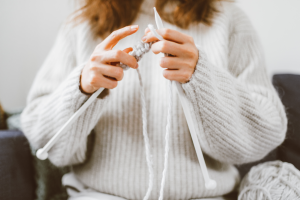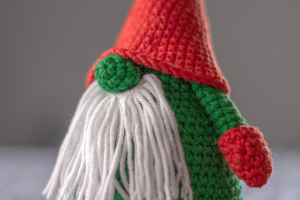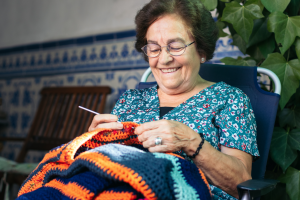Knitting isn’t just about creating cozy scarves or blankets—it’s a transformative activity that can greatly enhance your mental well-being. With its rhythmic patterns and creative process, knitting has become a go-to for many seeking solace in today’s fast-paced world.
Knitting offers more than just a creative outlet; it provides a therapeutic escape from the stresses of daily life. As you focus on each stitch and pattern, the mind is able to quiet the noise of the outside world, creating a space for relaxation and mental clarity. This calming effect has made knitting a popular choice for people looking to unwind and recharge, whether during moments of anxiety, sadness, or fatigue.
Additionally, knitting encourages mindfulness, helping individuals stay present in the moment. The repetitive nature of the craft allows you to engage fully with the task at hand, promoting a deep sense of calm. This meditative quality can have significant benefits for mental health, including reduced stress and improved mood, making knitting an effective tool for self-care.
Beyond the individual benefits, knitting also fosters a sense of accomplishment and pride. Each completed project, no matter how simple, provides a visual reminder of the time and effort invested, boosting self-esteem and confidence. This feeling of achievement can be especially empowering for those who struggle with feelings of inadequacy or uncertainty.
A Growing Trend in Mindful Activities
Mindfulness has taken center stage in self-care, and knitting fits perfectly into this trend. The act of focusing on each stitch helps you stay present, much like meditation. Sounds intriguing, right? Let’s dive into the specific mental health benefits of knitting.
Stress Relief and Relaxation
The Calming Effect of Repetitive Motions
Knitting involves repetitive hand movements, which can have a calming effect on your mind. It’s like a lullaby for your brain. The repetitive motions help lower stress and anxiety levels, making it easier to relax and unwind.
How Knitting Helps Reduce Cortisol Levels
Studies suggest that knitting can decrease cortisol, the stress hormone. When you’re focused on creating that perfect pattern, your mind lets go of worries. It’s a peaceful escape from the chaos of daily life.
Enhancing Focus and Mindfulness
Staying Present with Each Stitch
Knitting demands your attention, stitch by stitch. This focus naturally pulls you into the present moment, allowing you to forget distractions and embrace mindfulness.
How Knitting Encourages a Meditative State
Many compare knitting to meditation. The rhythm of the needles and the texture of the yarn create a sensory experience that soothes the mind and fosters a meditative state.
Boosting Self-Esteem and Confidence
The Joy of Creating Something Tangible
There’s a unique satisfaction in holding something you’ve made with your own hands. Each completed project gives you a sense of achievement, boosting your self-esteem.
Overcoming Challenges Through Knitting Projects
Tackling a complex pattern or learning a new technique can be challenging, but overcoming these hurdles builds confidence and resilience.
Promoting Social Connections
Joining Knitting Groups and Communities
Knitting isn’t just a solo activity; it’s a fantastic way to connect with others. Joining a knitting circle or online community helps you meet like-minded people and form meaningful friendships.
Strengthening Relationships Through Shared Interests
Knitting with friends or family can strengthen bonds. Sharing tips, materials, and even laughs over dropped stitches fosters closeness.
Improving Cognitive Function
Keeping Your Brain Active
Knitting engages your brain in planning, problem-solving, and memory recall. It’s like a workout for your mind, helping keep it sharp.
Preventing Cognitive Decline with Creative Hobbies
Studies show that hobbies like knitting can reduce the risk of cognitive decline. It’s a fun and creative way to keep your brain healthy as you age.
Knitting as a Therapeutic Tool
Knitting in Mental Health Therapy
Therapists often recommend knitting as a therapeutic activity. Its calming effects make it an excellent tool for managing anxiety, depression, and even PTSD.
Stories of Recovery and Healing Through Knitting
Many people have found healing through knitting, using it to cope with loss, trauma, or illness. Their stories inspire others to pick up the needles.
Physical Health Benefits
Improving Fine Motor Skills
Knitting isn’t just good for your mind; it’s great for your hands too. It helps improve dexterity and coordination, especially in older adults.
Reducing Physical Symptoms of Stress
Knitting can also ease physical tension, such as headaches or muscle pain, by promoting relaxation and reducing stress.
How to Get Started with Knitting
Choosing the Right Materials for Beginners
Starting is simple: grab some yarn, needles, and a beginner-friendly pattern. Opt for chunky yarn and larger needles for easier handling.
Easy Patterns to Try When Starting Out
Scarves, dishcloths, and simple headbands are perfect for beginners. Focus on mastering basic stitches before tackling more complex projects.
Knitting is more than a craft—it’s a gateway to better mental health. Whether you’re looking to de-stress, boost your confidence, or connect with others, knitting has something to offer. So why not pick up some needles and start today?
In addition to the mental health benefits, knitting also provides a sense of accomplishment. Completing a project, no matter how small, can boost your self-esteem and provide a tangible reminder of your abilities. This feeling of achievement can positively impact your overall outlook on life, especially during challenging times.
Moreover, knitting fosters mindfulness. The repetitive nature of the craft encourages you to focus on the present moment, which can help reduce anxiety and promote relaxation. This mindful practice not only improves mental well-being but also nurtures creativity and self-expression.
Lastly, knitting is a great way to build a sense of community. Whether you join a local knitting group or participate in online forums, the shared experience of creating something with your hands can forge connections and create lasting friendships. These social bonds are crucial for emotional support and can further enhance your mental health.



